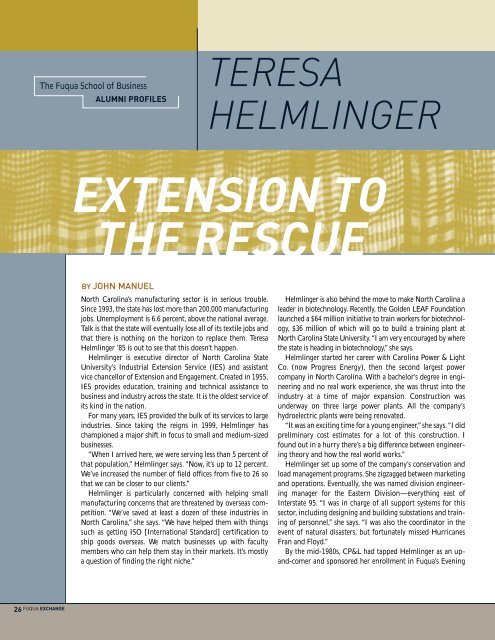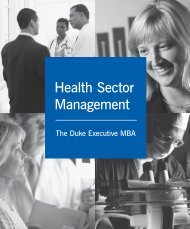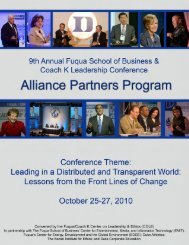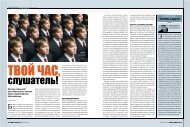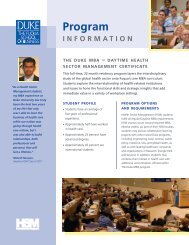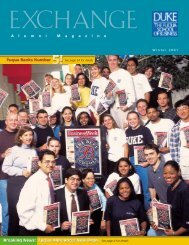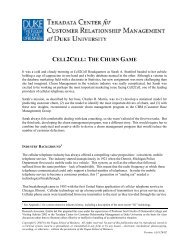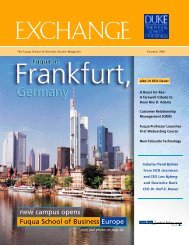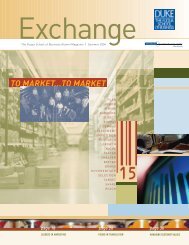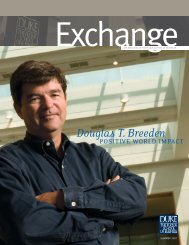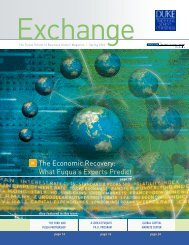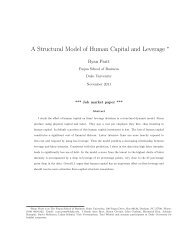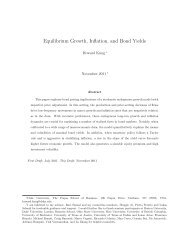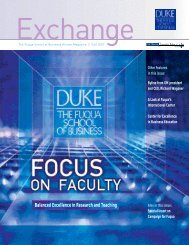Exchange Magazine, Fall 2003 - Duke University's Fuqua School of ...
Exchange Magazine, Fall 2003 - Duke University's Fuqua School of ...
Exchange Magazine, Fall 2003 - Duke University's Fuqua School of ...
You also want an ePaper? Increase the reach of your titles
YUMPU automatically turns print PDFs into web optimized ePapers that Google loves.
26 FUQUA EXCHANGE<br />
The <strong>Fuqua</strong> <strong>School</strong> <strong>of</strong> Business<br />
ALUMNI PROFILES<br />
TERESA<br />
HELMLINGER<br />
EXTENSION TO<br />
THE RESCUE<br />
BY JOHN MANUEL<br />
North Carolina’s manufacturing sector is in serious trouble.<br />
Since 1993, the state has lost more than 200,000 manufacturing<br />
jobs. Unemployment is 6.6 percent, above the national average.<br />
Talk is that the state will eventually lose all <strong>of</strong> its textile jobs and<br />
that there is nothing on the horizon to replace them. Teresa<br />
Helmlinger ’85 is out to see that this doesn’t happen.<br />
Helmlinger is executive director <strong>of</strong> North Carolina State<br />
University’s Industrial Extension Service (IES) and assistant<br />
vice chancellor <strong>of</strong> Extension and Engagement. Created in 1955,<br />
IES provides education, training and technical assistance to<br />
business and industry across the state. It is the oldest service <strong>of</strong><br />
its kind in the nation.<br />
For many years, IES provided the bulk <strong>of</strong> its services to large<br />
industries. Since taking the reigns in 1999, Helmlinger has<br />
championed a major shift in focus to small and medium-sized<br />
businesses.<br />
“When I arrived here, we were serving less than 5 percent <strong>of</strong><br />
that population,” Helmlinger says. “Now, it’s up to 12 percent.<br />
We’ve increased the number <strong>of</strong> field <strong>of</strong>fices from five to 26 so<br />
that we can be closer to our clients.”<br />
Helmlinger is particularly concerned with helping small<br />
manufacturing concerns that are threatened by overseas competition.<br />
“We’ve saved at least a dozen <strong>of</strong> these industries in<br />
North Carolina,” she says. “We have helped them with things<br />
such as getting ISO [International Standard] certification to<br />
ship goods overseas. We match businesses up with faculty<br />
members who can help them stay in their markets. It’s mostly<br />
a question <strong>of</strong> finding the right niche.”<br />
Helmlinger is also behind the move to make North Carolina a<br />
leader in biotechnology. Recently, the Golden LEAF Foundation<br />
launched a $64 million initiative to train workers for biotechnology,<br />
$36 million <strong>of</strong> which will go to build a training plant at<br />
North Carolina State University.“I am very encouraged by where<br />
the state is heading in biotechnology,” she says.<br />
Helmlinger started her career with Carolina Power & Light<br />
Co. (now Progress Energy), then the second largest power<br />
company in North Carolina. With a bachelor’s degree in engineering<br />
and no real work experience, she was thrust into the<br />
industry at a time <strong>of</strong> major expansion. Construction was<br />
underway on three large power plants. All the company’s<br />
hydroelectric plants were being renovated.<br />
“It was an exciting time for a young engineer,” she says.“I did<br />
preliminary cost estimates for a lot <strong>of</strong> this construction. I<br />
found out in a hurry there’s a big difference between engineering<br />
theory and how the real world works.”<br />
Helmlinger set up some <strong>of</strong> the company’s conservation and<br />
load management programs. She zigzagged between marketing<br />
and operations. Eventually, she was named division engineering<br />
manager for the Eastern Division—everything east <strong>of</strong><br />
Interstate 95. “I was in charge <strong>of</strong> all support systems for this<br />
sector, including designing and building substations and training<br />
<strong>of</strong> personnel,” she says. “I was also the coordinator in the<br />
event <strong>of</strong> natural disasters, but fortunately missed Hurricanes<br />
Fran and Floyd.”<br />
By the mid-1980s, CP&L had tapped Helmlinger as an upand-comer<br />
and sponsored her enrollment in <strong>Fuqua</strong>’s Evening


